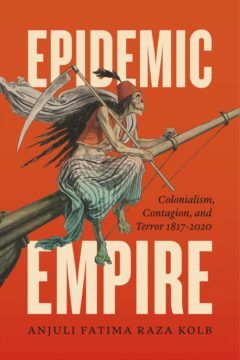From the blog of the University of Chicago Press:
 Terrorism has often been described as a cancer, an infection, an epidemic, a plague. In her new book, Epidemic Empire, Anjuli Fatima Raza Kolb tracks this persistent trope of terrorism as a “social contagion,” from its roots in anti-rebellion colonial rhetoric through to the global war on terror. Raza Kolb’s demonstrates that the metaphor surfaces again and again at moments of crisis—including the current COVID-19 crisis. We asked the author a few questions about her book.
Terrorism has often been described as a cancer, an infection, an epidemic, a plague. In her new book, Epidemic Empire, Anjuli Fatima Raza Kolb tracks this persistent trope of terrorism as a “social contagion,” from its roots in anti-rebellion colonial rhetoric through to the global war on terror. Raza Kolb’s demonstrates that the metaphor surfaces again and again at moments of crisis—including the current COVID-19 crisis. We asked the author a few questions about her book.
Epidemic Empire has turned out to be quite prescient. We began preparing the book for publication in early 2020, just before we entered COVID-19 lockdown. How have the events of this past year sharpened your understanding of the themes in the book?
Thank you for asking this question—it’s been on my mind constantly over the last ten months. Also, suddenly, on everyone else’s mind! In the early days of my research, I was getting a lot of pushback on my work’s relationship to what’s casually called “social construct” theory, an effect of deconstruction, which argues that certain seemingly stable ontological categories like gender or race are in fact products of the social. Judith Butler’s monumental Gender Trouble is a good example here, and it’s also a good example of how saying something is socially constructed never means saying it’s ethereal or random or unimportant.
How can “disease” be construed as a social construct? Isn’t there something plainly material about when someone falls sick? I heard these questions a lot.
More here.
